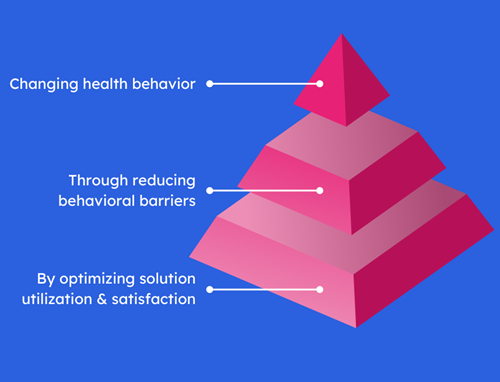Atlantis Health's Perspective on Patient Engagement

Why Patient Engagement
In the ever-evolving landscape of healthcare, few terms have garnered as much attention and importance as 'patient engagement'.
Ubiquitous in its presence across healthcare settings, from academic literature to clinical practice, and policy discussions to public health campaigns, the concept of patient engagement has become a cornerstone in modern healthcare delivery.
Yet, behind its widespread usage lies a complex and multifaceted notion that extends far beyond a mere buzzword.
The global behavioral science team at Atlantis Health set out to formalize the definition and measurement of patient engagement in the context of patient support solutions.
Recognizing the pivotal role that patient engagement plays in enhancing healthcare outcomes and experiences, our approach was comprehensive and collaborative, drawing upon insights from various sources.
An Iterative Approach to Definition and Measurement
We began by conducting a review of existing literature, encompassing academic papers, industry reports, and best practices in patient engagement. This step allowed us to establish a foundational understanding of the key concepts, frameworks, and dimensions of patient engagement prevalent in the healthcare landscape.
Subsequently, we embarked on a series of discussions with both internal and external healthcare stakeholders. Through these discussions, we accessed firsthand perspectives on the challenges, opportunities, and priorities associated with patient engagement, as well as insights into the effectiveness of existing patient support solutions. Additionally, we leveraged existing quantitative data collected from our patient support solutions, including metrics relating to program utilization rates and behavior change.
By triangulating insights from the literature, stakeholder discussions, and quantitative data analysis, we were able to develop a comprehensive definition of patient engagement tailored to the specific needs and contexts of our patient support solutions.
This iterative process of research, consultation, and analysis enabled us to articulate a definition that serves as a guiding principle for the co-design, solutions, and evaluation of our patient engagement solution, ensuring that they are responsive to the evolving needs and preferences of patients and healthcare providers.
Arriving at an Agreed Definition
Ultimately, this process led us to define patient engagement as:
the process of inspiring and enabling people to take an active role across their health journey using the latest behavioral science to build a person’s capability, provide the opportunity, and enhance their motivation to adopt and maintain positive health behaviors from illness prevention to management.
This definition encompasses the essence of patient engagement by elucidating:
- what it involves (inspiring and enabling active participation);
- why it is essential (to promote positive health behaviors);
- how it is achieved (utilizing behavioral science to enhance capability, opportunity, and motivation); and
- when it is applied (across the entire health journey, from prevention to illness management).
Defining our Measurement Approach
The process of definition also included specifying the key metrics necessary to determine the effectiveness of patient engagement initiatives. The key metrics are categorized as encompassing three core, hierarchical domains.
The first domain is that of behavior change. This is the primary outcome of any patient support initiative and can encompass both self-reported and objective measures of health-related behavior, such as persistence and adherence to medication.
The second domain is an assessment of the barriers to behavior change. This includes assessing the modifiable factors influencing behavior change over time. Within the outcome hierarchy, reducing behavioral barriers supports a patient to achieve the desired behavior change.
The third domain is experience and includes metrics relating to solution utilization and satisfaction among patients, caregivers and healthcare professionals. From a hierarchical perspective, it is through experience that behavioral barriers are reduced and behavior change can occur.

Optimizing Patient Engagement
The process of formally defining patient engagement has been pivotal to the ongoing refinement of our patient support solutions thereby ensuring that we can continue to deliver solutions that truly engage.
The domains of patient engagement and key associated metrics are embedded into our best practice Measurement Framework.
